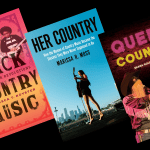I like everything but….
“‘Cause I think what they’ve done is well worth doin’
And they’re doin’ it the best way that they can
You’re the only one that you are screwin’
When you put down what you don’t understand.”
— Kris Kristofferson, from “If you don’t like Hank Williams”
When I’m getting to know a new person, a question I sometimes like to ask is “What kind of music do you like?”
The most common response I get is something to the effect of “I like just about everything. …” It seems few of us want to be pinned down and eclecticism is considered a virtue.
But, as often as not, that “everything” is followed by a “but.” It seems many people like every kind of music they can imagine except a particular style or genre that strikes the wrong … chord, shall we say?
Music is a big part of our culture and each genre often comes from a particular subculture. But, the stereotypes people associate with some of our subcultures often limits their ability to hear something new and enjoy it for what it is.
So now, when I hear “I like everything but… ” often I translate that into something else:
I like everything but … country music, because country music comes from backward, backwoods, southern rednecks, ignorant and possibly racist, playing the same three chords over and over.
I like everything but rap or hip hop, because that music comes from violent, angry inner city youth bent on destruction and misogyny.
I like everything but classical or opera, because it’s just for boring, rich culture snobs who look down on the rest of us.
I like everything but hard rock or heavy metal, because it’s just angry, possibly Satan-worshipping long haired guys with nothing better to do than take drugs and engage in reckless sex with groupies.
Of course, stereotypes come from somewhere. As I was writing this column, I ran across a 2007 article in the journal Psychology of Music by Peter J. Rentfrow and Samuel D. Gosling. In their article, entitled “The content and validity of music-genre stereotypes among college students,” they write that they “found that individuals have robust and clearly defined stereotypes about the fans of various music genres” and that “many of these music-genre stereotypes possess a kernel of truth.”
But, the assumptions we bring into our musical experience can either enhance or inhibit our ability to enjoy the artistry. If we come into the experience with preconceived notions, what we take away from it will likely be affected, often to the negative.
The interesting thing is you’ll rarely hear these stereotypes from musicians. They know how important it is to listen with an open mind and they cross genres often. The Beatles recorded a Buck Owens song. Merle Haggard may have poked fun at hippies, but he also listened to their music and he often referred to his own style as “country jazz” (Diana Krall is one of his favorite artists). Louie Armstrong performed with the father of country music, Jimmie Rodgers. Ray Charles made some of the most influential country recordings ever. Willie Nelson made a reggae album. Country singer Brad Paisley and rapper LL Cool J are currently generating both praise and criticism for their recent duet.
None of this is to say that it’s wrong to have favorite artists or genres. I certainly have mine. But, listening to other styles, especially things outside our own experience, is what helps us generate new mental connections and even empathy — and we certainly could use more of that.
Unfortunately, the way the industry, especially radio, brings music to us exacerbates the problem. This was expressed well in a book I read recently. The author, Duncan McLean, is a Scottish writer who came into a small amount of money and decided to spend a summer exploring Texas tracking down the music and musicians related to one of his heroes, western swing pioneer, Bob Wills.
In his book “Lone Star Swing,” McLean writes: “Music in America is so well niched these days — each variety with its own dedicated TV channels, radio stations, theme parks — that once you know what you like, there’s little chance of ever stumbling across some new recordings or artists that are going to surprise you or shake you up. In fact, it seemed to me that the chief result (or even the chief purpose) of music in the States was to keep you from getting all shook up. … There’s no boundary crossing, no transgression, no surprises. Music doesn’t change people’s lives in the USA today, it confirms the life you’ve already chosen or had chosen for you.”
These days, you have to go out of your way if you want to hear something new. Try it, you won’t regret it.
I originally wrote this for my small town newspaper. I live in one of those cities with a population of over 50,000 that is trying hard to be a town of 5,000. I doubt this audience has as much need for the message, but it’s my first blog post, so what the heck.
Michael Carley is a writer (among other things) from Porterville, California. He writes a weekly column for the Porterville Recorder and recently self-published a short story called “People Like That” which is available via Amazon Kindle. He can be reached at mcarley@gmail.com. (This column originally appeared in the Porterville Recorder in April 2013).




